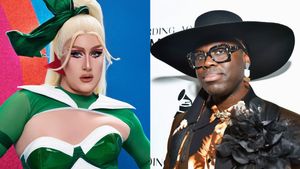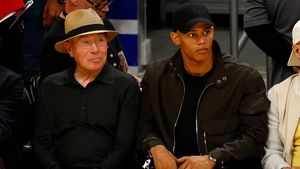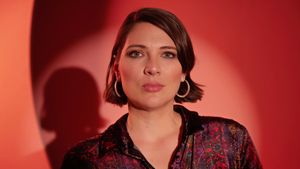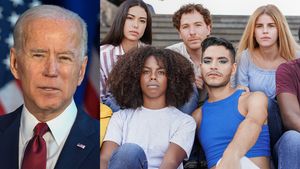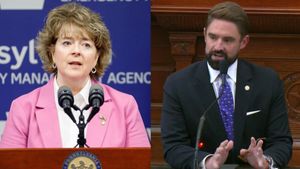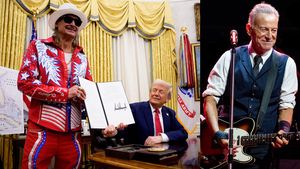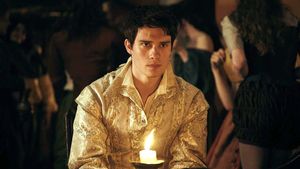Although he's known mostly for his talent as an out and proud YouTuber,Connor Franta also has a very big passion for music — just not in the way you might think.
He doesn't sing and he doesn't play an instrument. He also doesn't write or produce his own songs. Instead, he uses his platform as an influential social media star to compile albums focusing solely on up-and-coming musicians and their songs, in an effort to pay it forward and get audiences to listen to artists who are on the come up and who otherwise might have not had any attention at all. And he's successful at it. So much so that he and his manager, Andrew Graham, have teamed up with their friend Jeremy Wineberg, a music industry insider, to create Heard Well, a record label whose entire purpose so far is to have other well-known social media personalities (a.k.a. 'tastemakers') create compilations of more on-the-rise musicians.
Although their business model is almost unheard of, according to Billboard, something is obviously going right.
We talked to Connor, Andrew, Jeremy and got their insight on the inspiration behind Heard Well, and what makes this special record label different from all the other, more traditional ones.
Pride: What exactly is the focus and concept of Heard Well? What made you want to start a record label?
Connor Franta: Essentially, Heard Well is a record label that is currently focusing on connecting social influencers with the music industry and [connecting] artists with the music industry. At the moment, we’re specifying that we want to connect with up-and-coming artists and use the social influencers as a way to promote this new and amazing music that isn’t otherwise getting “heard well.” [Laughs] There’s the plug!
I’m only one-third of it. Jeremy had a record label called Opus Label, and I initially started doing my music compilations through his record label, and it was going so well, and we really liked the concept of turning it into kind of a socially driven record label. Me, Andrew, and Jeremy combined forces and essentially thought it would be a cool idea to create our own.
What made you want to be a part of a label that is all about getting unknown artists and shining a spotlight on them for younger fans?
Andrew Graham: Being in the talent representation business, I get excited by talent development. I love finding diamonds in the rough and polishing them and helping them build businesses around them. I really look at what Heard Well is doing as sort of an extension of my passion in talent representation in the first place, which is to elevate and accelerate really great voices. Whether that is literally a voice in the sense of a musician or if it's a vlogge, or what have you. In particular, I’m an entrepreneurial guy, and one of my favorite things about the talent representation business and management is the ability to produce projects with clients, and Connor and I have been looking for something that we could truly collaborate on as business partners for quite a while. This was an obvious first step.
What is your reaction when you see young people have such a huge social reach and impact?
Jeremy Wineberg: I think it’s awesome. I just turned 30, but going back even 10 years ago or even to my teenage years, when I was discovering music, I’d go to the record store and you wouldn’t really know what to find. You’d have to go and listen to everything. Even on iTunes, when it first launched, I would look in the new shop or I would search by genre to try to find music, and I think that we’re assisting in that process. It really comes down to trust, and I think that we’re extremely grateful that Connor’s fans trust us, and I think that it’s very important for Heard Well to sustain that level of quality in everything that we’re putting out.
Graham: It’s remarkably exciting. I think that this is the most exciting time to be a part of the representation business because our clients have autonomy. They don’t need a TV network or a film studio to distribute their message — they have the ability to do it on their own. I’m quite young to be doing what I’m doing. I’m 26 years old, so in a lot of instances I have grown up with the stars I represent, in a way. It feels right now a little bit like we have a chip on our shoulder, we have something to prove, which is awesome, because I don’t think it’s going to be that way in five to ten years. The way the industry is morphing, and the data points and success stories we’ve had coming off of people like Connor, it’s really indicating this is mainstream. It’s not arriving, it has arrived. It’s tremendously exciting. I couldn’t be happier to be a part of it.
What kind of musicians and artists will have a place in Heard Well? Is the artists roster defined mostly by your personal tastes, or do you try to include a diverse range of artists from different genres?
Franta: Personally on my compilations, I only put on music that I like, and I am not particularly specific to one type of genre. I’m very into, I guess, pop music and alternative music, so a lot of the music falls into that category. Whatever songs I like, I’ll put on the compilation. If one happens to be a country song, which is pretty far-fetched for me, but if it happens to be a country song and I like it, I’ll put it on the compilation with artist permission.
We do have a large range of varying music tastes so far. We had Amanda Steele, who actually enjoys rap a lot, and her compilation had a lot of rap on it. Lohanthony likes similar music to me, except a little bit more darker, so darker pop. Then, JC Caylen, he’s into more of the EDM side of things.
Who are some up-and-coming social tastemakers you are getting excited about and who you want to have be a part of Heard Well?
Franta: We’re working with the initial ones who are in the vlogger category, but we’re trying to figure out ways to work with people who are not just in the blogger category, who maybe are more in the educational side or the gaming category on YouTube. Regardless of who they are, I just want to make sure that their interested in music, because that now reflects in their interests when they put it out to their audience.
What do define as a tastemaker, and what do they do for music?
Franta: A social influencer or tastemaker is someone who has built up a large following on technically any platform, whether it’s YouTube or Twitter or Vine or Instagram, and they use their voice to kind of influence their audience. They are more of like a lifestyle … I do lifestyle content and I’m just naturally tweeting and YouTubing and Instagramming all that about what I like and what things I’m interested in. By default, I’m a tastemaker. I’m an influencer, whether I like it or not. I’m definitely influencing millions of people by saying I like this song or I like this shirt, because then they’re going to go check out that shirt or that song.
Why do you think it's important for young people to help each other out and let other know about their craft and their art?
Graham: I think that it’s at the very core of sort of the YouTube audience, and when I say the YouTube audience, I guess you can extrapolate that for it to just mean this particular generation. You have a really socially conscious generation, you have a generation that really cares about giving back in a lot of ways. Connor is a great example of both of these things, but particularly in the YouTube community, there’s this concept of collaborating. If I make a video on your channel, you make a video on my channel, we’re going to share audiences, and together we’re going to grow one another and build one another up. I think that same concept is inherently baked into Heard Well. It’s important in a lot of ways, because there’s a lot of noise now. Particularly in the music space, it’s harder than ever to sort of become discovered because there are more voices that there have been before, that have their own autonomous distribution. I think we’re serving a really special need in identifying and curating some of the best voices that are out there that otherwise might not have a platform. You’ll notice a lot of these artists, a lot of them end up going, getting some great radio play, end up signing to a major label. We’re happy to be a part of that story. We don’t have to be the whole story.
Wineberg: I think that there is so much great music. In today’s world, music is becoming harder and harder and harder to sell, and it’s becoming more difficult for artists to make money. It’s becoming more difficult for artists to be discovered, and we have a major oversaturation in the space. Traditionally, 10 years ago, not everyone could go and be an artist. Now today, on your laptop, you can record a song and five minutes later you can put it on SoundCloud and 15 minutes later you can tweet at someone with a lot of followers and before you know it, you could be a superstar. Or you are just another artist that is on SoundCloud, just like all the other millions of artists, and no one ever stumbles across.
I think that, you know, someone like Connor who has so many fans — so many real people, real fans — his engagement is just so incredible, that he is able to really find things he likes and make them successful and share them with the bands. Share these bands with his fans. I think that’s something that is just so important because he’s not the end-all, but he’s definitely contributing to the success of some and giving great music an opportunity to be heard that might otherwise be overlooked or never listened to. That’s kind of what we’re doing that is special with all of our clients, and how we go about curating these compliations. Hopefully we find the next gem and we take them under our wing and we promote them, and put out their album. We become part of making someone’s career.
Why did you base the Heard Well model on compilations, as opposed to signing an artist and having them release their own album, like a more traditional record label?
Franta: I wanted a convenient way for my audience to be able to download this music. I could have easily just created a free playlist on YouTube or Spotify or something, but I want it to be a means for these up-and-coming artists to make a profit and for them to be sustainable in this market. It’s a very hard market to break into. The music industry, the entertainment industry is very hard to break into, so if I can use my platform and my voice on the internet for these artists and share it with them and give them a fighting chance, I think that’s a great opportunity.

Head over to iTunes and Spotify to listen to some of Heard Well's latest releases, including Connor Franta's Common Culture, Vol. IV, JC Caylen's Neptones, Amanda Steele's Gateway, and Lohanthony's Landscapes.













































